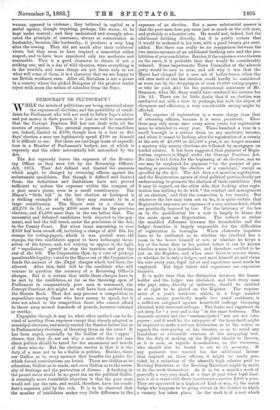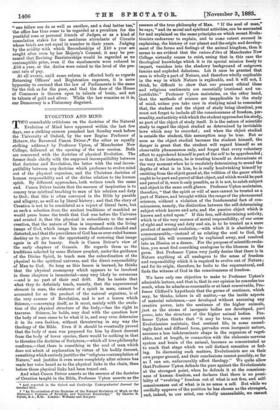DEMOCRACY OR PLUTOCRACY?
WHILE the minds of politicians are being exercised about the expenses of elections, and the possibility of candi- dates for Parliament who will not need to follow lago's advice and put money in their purses, it is just as well to remember that the Corrupt Practices Bill has not dealt with all the sources of expense. The personal expenses of the candidate are, indeed, limited to £100, though how in a four or five days' election a man can legitimately spend £100 on himself it is difficult to see. But there are two large items of expendi- ture in a Member of Parliament's budget, one of which is expressly and the other inferentially left untouched by the Act.
The Act expressly leaves the expenses of the Return- ing Officer as they were left by the Returning Officers' Act, 1875. That Act defined and limited the amounts which might be charged by returning officers against the unfortunate candidates. But though it defined and limited them, the definitions and limitations have not proved sufficient to reduce the expenses within the compass of a poor man's purse, even in a small constituency. The Mayor's "little bill " in the last election at Liverpool is a striking example of what they may amount to in a large constituency. The Mayor sent in a claim for £2,273 5s. 3d., or nearly £200 more than in the previous election, and £1,000 more than in the one before that. The successful and defeated candidates both objected to the pay- ment; and had the bill taxed, under the provisions of the Act, in the County Court. But when items amounting to over £350 had been struck off, including a charge of £99 10s. for stamps for voting-papers, which it was proved were old stamps, the two candidates appear to have bethought them- selves of the future, and, not wishing to appear in the light of "repudiators," agreed to stop the taxation, and pay the rest of the bill. The Corporation then, by a vote of perhaps questionable legality, voted to the Mayor out of the Corporation funds the amount of the illegal charges which had been dis- allowed. After this, bold will be the candidate who will venture to question the accuracy of a Returning Officer's charges. But it is certain that while those charges have to be met by the candidates, so far as the throwing open of Parliament to comparatively poor men is concerned, the Corrupt Practices Act might as well have been omitted from the Statute Book. That Act may prevent a competition in expenditure among those who have money to spend, but it does not admit to the competition those who cannot afford to throw away several hundreds of pounds, however talented or worthy.
Unpopular though it may be, what other method can be de- vised of meeting these expenses except that already adopted in municipal elections, and nearly carried the Session before last as to Parliamentary elections, of throwing them on the rates ? It has been urged, especially by the Gallios of the " upper " classes, that they do not see why a man who does not care about politics should be taxed for the amusement and benefit of those who do. But the obvious answer is that it is the duty of a man not to be a Gallio in politics. Besides, there are Gallios as to every measure that benefits the public for which forced contributions are levied. There are Gallios as to education, Gallios as to roads, and even Gallios as to the neces- sity of drainage and the prevention of disease. A farthing in the pound extra would be no great tax on the political Gallio. A seemingly more formidable objection is that the poor man would not pay the rate, and would, therefore, have his candi- date's expenses paid by the rich. It is to be observed that the number of candidates makes very little difference to the expenses of an election. But a more substantial answer is that the poor man does pay rates just as much as the rich man, and probably at a heavier rate. He would not, indeed, feel the additional farthing directly, but it is pretty certain that it would be reckoned in his rent, with a good twenty per cent. added. But there can really be no comparison between the two inconveniences of an additional farthing rate and the pro- hibition of poor candidates. Besides, if the expenses were thrown on the rates, it is probable that they would be considerably reduced. Some importunate Town Councillor of the adverse party would be sure to arise, and ask why it was that the Mayor had charged for a new set of ballot-boxes, when the old ones used at the last election could hardly be considered as worn out by the dropping-in of even 10,000 voting-papers ; or why he paid £15 for the professional assistance of Mr. Gammon, when Mr. Snap would have rendered his services for 13s. 4d. There can be little doubt that if an election was conducted not with a view to pickings, but with the object of cheapness and efficiency, a very considerable saving might be effected.
The expense of registration is a worse charge than that of returning officers, because it is more persistent. Elec- tions may only occur once every seven years, but registration must be attended to every year. Three hundred a year in a small borough is a serious drain on any moderate income, and when it comes to looking after the registration of a county at the rate of £1,000 or £1,500 a year, it no longer remains a mystery why county elections are followed by mortgages on landed estates. It has been suggested that payment of Regis- tration expenses is illegal under the Corrupt Practices Act. No time is laid down for the beginning of an election, and no one may be employed for payment " for the purpose of pro- moting or procuring the election of a candidate," except as specified by the Act. The Act does not mention registration, and the Registration agents of rival political parties clearly are endeavouring to promote the election of their candidates. But it may be argued, on the other side, that looking after regis- tration has nothing to do with "the conduct and management of an election," and that the connection is too remote. But whatever the law may turn out to be, it is quite certain that Registration expenses are expenses of a very serious kind, which are practically imposed by law. For the intricacy of the law as to the qualification for a vote is largely to blame for the sums spent on Registration. The refined or rather the muddled difference between the householder and the lodger franchise is largely responsible for the difficulties
of registration in boroughs. When elaborate inquiries have to be instituted as to whether the landlord has a• room in the house himself or not, or whether he keeps a key of the front door in his pocket. before it can be known whether a man is a householder, and therefore entitled to be put on the Register, and when once there to remain there, or whether he is only a lodger, and must himself go and claim his vote every year, legal talent and experience must needs be employed. But legal talent and experience are expensive luxuries.
It is quite time that the distinction between the house- holder and the lodger was abolished, and that every man. who pays rates, directly or indirectly, should be entitled. as of right to be placed on the Register. The require- ment of a year's residence, which, in a large number of cases, means practically nearly two years residence, is a sufficient safeguard against household suffrage becoming identical with universal suffrage. The loafer and vagabond do not sleep for " a year and a day " in the same bedroom. The domestic servant and the " unemancipated" son are not rate- payers ; and if need be, the ratepayer of the household might be required to make a solemn declaration as to the status as regards the rent-paying of his inmates, so as to avoid any fraudulent or colourable evasions of the ratepaying test. But the duty of making up the Register should be thrown, as it is now, as regards householders, on the Overseers, who should also be bound to see to its accuracy. If any payment was wanted for the additional labour thus imposed on these officers, it might be easily pro- vided by a reduction of the absurdly high salaries paid to Revising Barristers, or the Revising Barristers might be made to do the work themselves. As it is, for a month's work of generally a very easy kind, at a time of year when legal busi- ness is at a stand-still, these functionaries receive £200 a year. They are appointed in a haphazard kind of way, by the senior Judge who happens to be going circuit in the district in which a vacancy has taken place. As the work is of a sort which " one fellow can do as well as another, and a deal better too," the office has thus come to be regarded as a peculium for the youthful sons or personal friends of Judges, or as a kind of consolation stakes for the assiduous attendants of Circuits whose briefs are not equal in number to their years. Judging by the avidity with which Recorderships of 1.40 a year are sought after even by her Majesty's Counsel, it may be pre- sumed that Revising Barristerships would be regarded as no contemptible prize, even if the emoluments were reduced to £50 a year, or the , duties were raised to the level of the pre- sent rate of pay.
At all events, until some reform is effected both as regards Returning Officers' and Registration expenses, it is mere hypocrisy to contend that the law of Parliaments is the same for the rich as for the poor, and that the door of the House of Commons is thrown open to talents of brain, and not to talents of gold and silver. While the law remains as it is, our Democracy is a Plutocracy disguised.







































 Previous page
Previous page